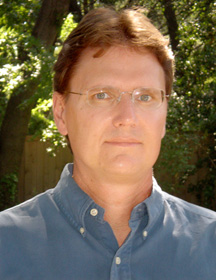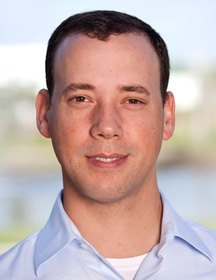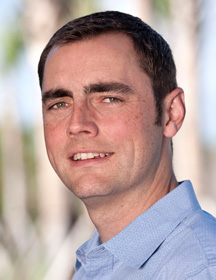

Scripps Research Appoints Three New Chemistry Faculty
By Eric Sauter
The Scripps Research Institute has appointed three new faculty members to its Department of Chemistry. All three will be located on the campus of Scripps Florida in Jupiter, Palm Beach County.
The three new appointments are: Tom Kodadek, professor with a joint appointment in the Department of Cancer Biology; Glenn Micalizio, associate professor; and Brian Paegel, assistant professor with a joint appointment in the Department of Molecular Therapeutics.
"All three are exceptional scientists and will be tremendous additions to the chemistry department and to the institute," said Gerald Joyce, dean of the Scripps Research faculty and a member of Scripps Research's Skaggs Institute for Chemical Biology. "The three have the distinction of being among the first new faculty hired in chemistry for the Scripps Florida campus."
K.C. Nicolaou, chair of the Scripps Research Department of Chemistry, said, "The addition of Kodadek, Micalizio, and Paegel to our Chemistry Department in Florida is a major expansion of our capabilities in chemical biology and chemical synthesis. Together with the teams already in place at Scripps Florida, these additions give the critical mass we need to attract more faculty and students and to make significant contributions to biomedical research in the years to come. We welcome them on board and look forward to working with them as we strive for discoveries in the chemical and biological sciences that will benefit society."
William Roush, professor of Chemistry and executive director of Medicinal Chemistry at Scripps Florida, added, "When we look for faculty appointments, we look for top-line scientists who have the potential to move in new directions, scientists who are ready to open new doors and help change the face of science. I can't think of a better description of these three new Scripps Florida scientists."
Tom Kodadek: Where the Discoveries Will Be Made
A little over two years ago, Tom Kodadek, head of translational research at the University of Texas Southwestern Medical Center, was given the National Institutes of Health Director's Pioneer Award, an award designed to support scientists of exceptional creativity. Kodadek was just one of only 13 scientists to receive the 2006 award.
Kodadek, who will arrive at Scripps Florida in the late spring (to coincide with the end of the school year for his daughter) will bring that award and his own exceptional creativity with him when he comes to Jupiter, Palm Beach County.
Kodadek has been director of the Division of Translational Research at the University of Texas Southwestern Medical Center since 2005, and a professor of Internal Medicine and Molecular Biology since 1998. He received his bachelor's degree in chemistry at the University of Miami and his Ph.D. in organic chemistry from Stanford University. He completed postdoctoral work in biochemistry the University of California, San Francisco, and joined the University of Texas, Austin, as an assistant professor in 1987.
Kodadek's research is aimed at finding substances that can diagnose and block specific immune responses without suppressing the entire immune system. This approach could be used to treat autoimmune diseases, cancer, and infection, among other conditions.
In pursuit of that goal, Kodadek created a vast collection of peptoids—highly stable molecules closely related to the peptides that make up proteins. These peptoids serve as diagnostic markers in the search for autoantibodies—a type of protein produced by the immune system that acts against a host protein (instead of acting against a protein from a bacteria or virus). Autoanitbodies are the culprits in autoimmune diseases such as lupus. By arranging thousands of peptoids in a microarray, and using blood plasma samples from animals and patients with a known disease, peptoids that bind to antibodies associated with specific diseases could be easily recognized. Knowledge of how those peptoids interact with antibodies might then be harnessed to analyze or treat those diseases, he said.
"As a diagnostic tool, this is promising," Kodadek said. "It's also possible that there's a way to develop therapeutics here as well. It might be that these disease-specific autoantibodies are involved in the disease process and might be neutralized by the peptoid. This could allow us to block a specific antibody or T cell reaction without affecting anything else."
Kodadek believes that moving to Scripps Florida will help him accelerate the movement of any therapeutic candidates he does find into the development pipeline and on its way to patients.
"I've already made the transition to translational research," Kodadek said. "So in some regards, Scripps Florida is similar to what I have now in Texas. But the key ingredient that the institute provides is the bridge to the commercialized world of bio-pharmaceuticals. That's very important and Scripps Florida will be extremely helpful in that regard. So will be Scripps Research in La Jolla."
Kodadek's own peptoid screening technology will be a strong complement to Scripps Florida's successful high throughput screening facilities, he said, and the collaborative atmosphere makes everything—and anything—possible.
Glenn Micalizio: Is It Going to Help?
Coming to Scripps Florida from Yale, Glenn Micalizio thought about the new appointment as a way to help him accomplish a goal underlying many others—optimizing the relationship between chemistry and biology to find new drug leads.
"This is not a universally accepted vision," he said, expanding on his idea of what he plans to do in Jupiter. "We have already developed an area of organic chemistry that is unique and, in my opinion, quite powerful. But that's just the beginning—what can you do with that? What is it about the contributions of one scientist that can affect society? Are these contributions going to lead to a new medicine or help solve the energy crisis? If not, then what is it... exactly?"
Micalizio was introduced to organic synthesis and complex molecule construction through Scripps Research's Bill Roush, his advisor at the University of Michigan, where he finished his Ph.D. in 2001. After that, he did postdoctoral work at Harvard University in the laboratory of Stuart L. Schreiber, where he became even more focused on the intertwining of chemistry and biology.
"Going from Michigan to Harvard, I shifted focus from the synthesis of natural products to searching for a means to use chemistry to enable discovery in biology," he said. "How do you invent a new way for chemistry to accomplish that goal? The question alone presents an interesting way to think about advancing the field. I brought my own project to Schreiber's lab and spent my postdoctoral years trying to answer that question."
When it was time for Micalizio to start his own lab, he joined the faculty of Yale as an assistant professor. During his time in New Haven, Micalizio managed to develop new chemical methods for convergent synthesis, fusing carbon skeletons with unique carbon-to-carbon bond forming processes as a means create complex molecules.
He also managed to collect a number of high profile awards each year of his time at Yale, including the Beckman Young Investigator Award in 2005; the American Cancer Society Research Scholar Award in 2006; the Lilly Grantee Award in 2006; and the Boehringer Ingelheim New Investigator Award in 2007.
"It's hard to put together collaborations in science, which is what makes Scripps Florida so special," he said. "The institute is based on collaborative research at its very core. The fact that Scripps Florida also seems extremely interested in small molecules is great because that's what we do. Like I said, I define how important a contribution is based on what it can enable. We are now in a position to test out the collection of tools we've developed over the past five and a half years—I'm excited by the possibilities."
Brian Paegel: Taking Chemistry to New Dimensions
Brian Paegel, assistant professor in the Department of Chemistry, points to how the microchip revolution forever changed the face of computing. He is leading a similar revolution in chemistry and biology by applying the same principles of miniaturization.
"Much like in computing, routine chemical and biochemical processes used in industry such as DNA sequencing, cell-based screening, and genetic diagnostics become much more time- and cost-effective when they are scaled down," said Paegel. "And, when you leave the realm of tubes and flasks, you can do some pretty amazing things with liquids at small scales."
Paegel was still a graduate student in the laboratory of Richard Mathies at the University of California, Berkeley, when he first became intrigued with the field of directed evolution, pioneered by renowned Scripps Research Professor Gerald Joyce.
"I was absolutely fascinated by the idea that one could select or breed molecules to have certain chemical traits analogous to the ways that humans have bred animals and plants for millennia," Paegel said. "Only instead of harvesting seeds and planting the best stock, we use the tools of chemistry and molecular biology to select molecules with desirable chemical properties."
Paegel notes that, like natural selection, laboratory evolution is a repetitive cycle of selecting desirable individuals and generating new stock based on the selected individuals. Paegel chose to work with Joyce for his postdoctoral work, arriving at Scripps Research in 2004.
Combining Paegel's expertise in engineering and miniaturization and Joyce's knowledge in directed evolution, the two scientists designed a chip-based molecular evolution system. The chip, a microfluidic device, manipulates small volumes of sample under the control of a computer. "Because the entire experiment was computer-controlled, we could observe our molecules evolving and adapting in real time," explained Paegel. "These were the first baby steps of applying microfluidic technology to the complex biochemical task of evolution."
As a result of his work with Joyce, Paegel received a presitgious Pathway to Independence Award from the National Institutes of Health to continue his reseach as an independent investigator at Scripps Florida. He plans to develop even more sophisticated microfluidic circuits that will enable revolutionary approaches to directed evolution of nucleic acid and protein targets.
Of special interest to Paegel is a class of proteins that are displayed on cell surfaces. These membrane-associated proteins control chemical communication between cells and their environment, mediate infection by bacteria and viruses, and are the targets of the majority of modern pharmaceuticals.
"We aim to create billions of synthetic cell-like compartments with our microfluidic technology, which will allow us to apply the principles of directed evolution to these very complex molecules. These studies will likely cause us to rethink how we approach drug screening, and may pave the way to new vehicles for drug delivery that can be bred to target only diseased tissues, for example. Scripps Florida is the ideal interdisciplinary environment for pursuing these ambitious goals."
Send comments to: mikaono[at]scripps.edu

Professor Tom Kodadek.

Associate Professor Glenn Micalizio.

Assistant Professor Brian Paegel.
